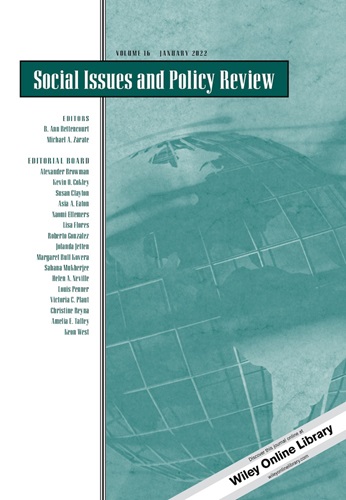减少公然和微妙的性取向和性别认同偏见(SOGIP)的干预措施:当前的知识和未来的方向
IF 5.6
1区 心理学
Q1 PSYCHOLOGY, SOCIAL
引用次数: 61
摘要
鉴于其普遍性和影响,减少对性和性别认同少数群体的偏见和防止对这些少数群体的消极行为是很重要的。本文介绍并给出了“性取向与性别认同偏见”(SOGIP)一词的定义,并讨论了其决定因素、构成以及测量方法。此外,我们回顾了最近关于减少sogip干预措施的社会心理学文献,确定了有关这些干预措施的科学知识差距,并就如何将现有知识应用于现实生活情境提出了建议。我们的结论是,目前有许多针对SOGIP的干预措施,其中一些似乎比其他更有效。特别有希望的干预措施是那些旨在唤起同情和观点采纳的措施,以及那些旨在发展少数和多数成员之间联盟的措施。然而,仍有改进的余地。总体而言,很少有经验证据表明干预效果的稳健性、潜在机制、效果持续时间和干预的边界条件。研究人员应关注性取向偏见的各个方面(即性取向偏见和性别认同偏见);不同的偏见表达(即公然的和微妙的),对少数群体的实际行为,以及对偏见的肇事者和目标。通过联合起来,研究人员和实践者应该致力于克服评估干预措施有效性方面的实际和理论障碍。政策制定者应该支持测试、改进、实施和分发干预方案的举措,并有助于将研究人员和实践者聚集在一起。本文章由计算机程序翻译,如有差异,请以英文原文为准。
Interventions to Reduce Blatant and Subtle Sexual Orientation‐ and Gender Identity Prejudice (SOGIP): Current Knowledge and Future Directions
Given its prevalence and impact, it is important that prejudice against sexual- and gender identity minorities is reduced and that negative behaviors against these minorities are prevented. We introduce and provide a definition of the term Sexual Orientation and Gender Identity Prejudice (SOGIP), and discuss its determinants and configurations as well as ways to measure it. Furthermore, we review the recent social psychological literature on SOGIP-reducing interventions, identify scientific knowledge gaps regarding these interventions, and offer recommendations on how to apply the available knowledge to real-life situations. We conclude that there are many interventions currently being employed to target SOGIP with some seeming more effective than others. Particularly promising interventions are those aimed at evoking empathy and perspective taking and those aimed at developing alliances between minority and majority members. However, there is still room for improvement. Overall, little empirical evidence speaks to the robustness of intervention effects, the underlying mechanisms, the duration of effects, and boundary conditions of interventions. Researchers should focus on all aspects of SOGIP (i.e., sexual orientation prejudice as well as gender identity prejudice); different expressions of prejudice (i.e., blatant and subtle), actual behavior towards minorities, and on both perpetrators and targets of prejudice. By joining forces, researchers and practitioners should aim to overcome practical and theoretical obstacles in evaluating the effectiveness of interventions. Policy makers should support initiatives that test, improve, implement and distribute intervention programs, and can help bring together researchers and practitioners.
求助全文
通过发布文献求助,成功后即可免费获取论文全文。
去求助
来源期刊

Social Issues and Policy Review
Multiple-
CiteScore
22.20
自引率
1.10%
发文量
9
期刊介绍:
The mission of Social Issues and Policy Review (SIPR) is to provide state of the art and timely theoretical and empirical reviews of topics and programs of research that are directly relevant to understanding and addressing social issues and public policy.Papers will be accessible and relevant to a broad audience and will normally be based on a program of research. Works in SIPR will represent perspectives directly relevant to the psychological study of social issues and public policy. Contributions are expected to be review papers that present a strong scholarly foundation and consider how research and theory can inform social issues and policy or articulate the implication of social issues and public policy for theory and research.
 求助内容:
求助内容: 应助结果提醒方式:
应助结果提醒方式:


